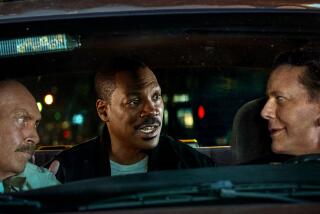On ‘Boomerang’ and Issues of Black and White : Eddie Murphy: All We Want Is Equal Treatment
In an interview published almost three years ago, I mentioned I had a dream regarding black artists. My hope at that time--and it is just as strong, if not stronger, today--was that black artists be appreciated in Hollywood as much as white artists.
Since that interview was published, there have been some positive strides made in the movie industry. African-American filmmakers such as Spike Lee, Reginald and Warrington Hudlin, Robert Townsend, Keenen Ivory Wayans, John Singleton, Julie Dash and Matty Rich have been able to have their stories told and receive the recognition they so justly deserve. On behalf of my movie-making brothers and sisters, and all actors of color, I must say that Hollywood is finally--although slowly--opening its eyes to the great, diverse pool of black talent.
Yet for every step we inch forward, for each iota of progress, there always will be those trying to knock us back down, and there always will be some who cannot accept our success. My new film, “Boomerang,” directed and produced by the aforementioned Hudlins, is the latest outlet for those critics who feel it necessary to demean and simplify the achievement of black people.
I must point out now that I am not utilizing this forum to attack, complain about or disagree with movie critics (and their reviews) in general.
What has compelled me to this public voicing of opinion is the fact that some reviewers--whether they like the movie or not--have insisted on making an issue about the racial composition of the film. “Boomerang” is a romantic comedy revolving around the lives of successful black people who work for a successful black company. Some people obviously have a problem with that, for the movie has been called a “fantasy,” a “reverse world” and “racist.”
For those who cannot rise above their own ignorance and admit to themselves that there are indeed successful black companies in this country, I suggest a review of the Black Enterprise magazine’s annual BE 100. The top five black-owned companies on this list generated sales of more than $2 billion--that’s billion--in 1991.
For those who feel that it’s racist for a film to have a predominately black cast, one has only to look at the countless movies that portray an all-white world. And consider all those films that did feature small roles for African Americans--we thank you for having the world believe that all people of color are pimps, prostitutes, drug dealers and criminals.
For those who believe that black people--regardless of their status--are not confronted with racism on a daily basis, it’s time to realize what’s really happening. The scene in the clothing store in “Boomerang” is not at all far-fetched. Oprah Winfrey and Debbie Allen have been turned away from stores; Warrington Hudlin has had trouble getting a cab on the streets of New York; my friends and co-workers have been mistreated in restaurants and on airlines.
“Boomerang” is a movie. For the most part, movies are fantasy. But I cannot be more passionate when I say that the situations found in this film are not from some fictional dream world. Until everyone can realize this, the cancerous roots of racism will continue to spread, and the people of this country will continue to be torn apart and destroyed by the disease of misunderstanding.
My dream is still the same. I want African Americans to be able to win Oscars, to do films about our people when we want to, to get films made and to do what we want to as artists. All we want is to be accepted as equals.
Peace and love’s all right.
More to Read
Only good movies
Get the Indie Focus newsletter, Mark Olsen's weekly guide to the world of cinema.
You may occasionally receive promotional content from the Los Angeles Times.










